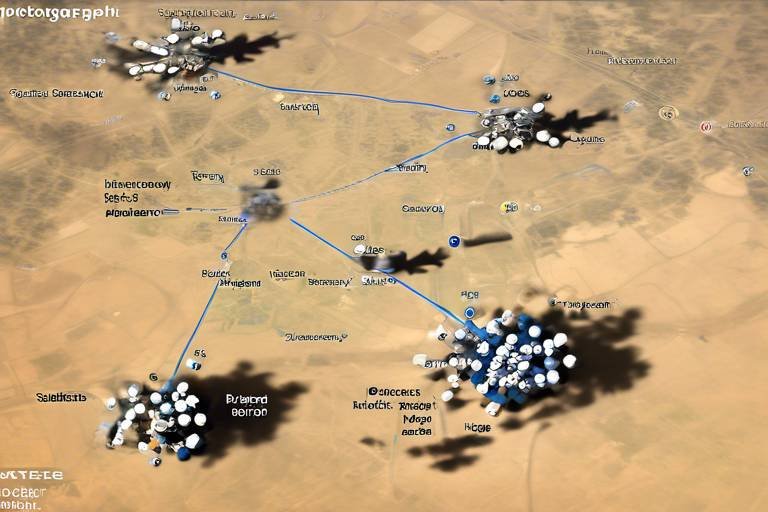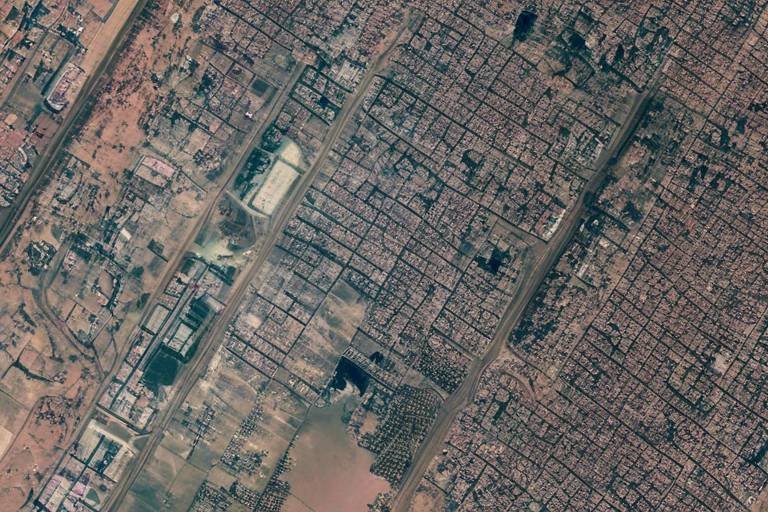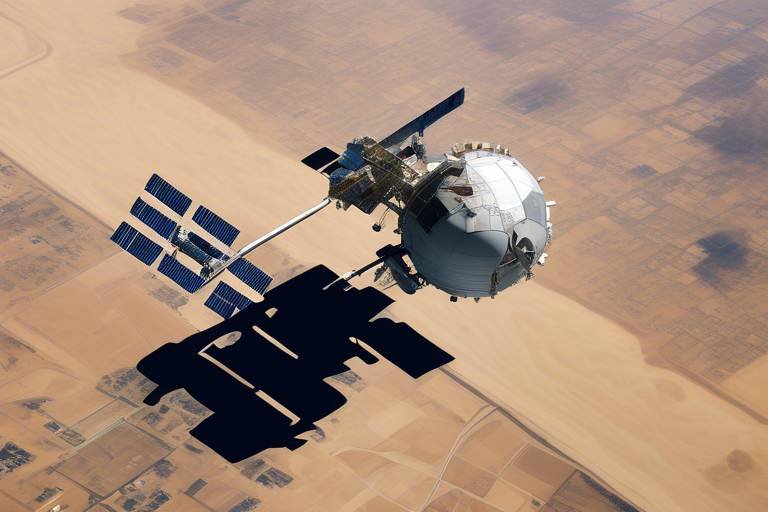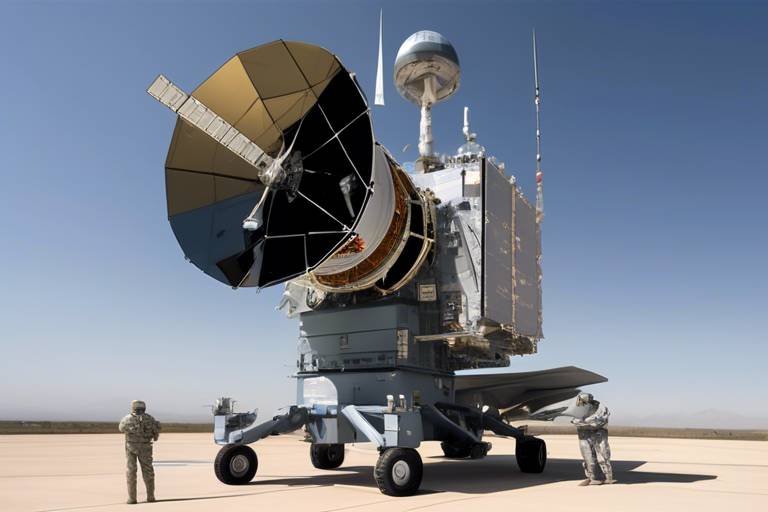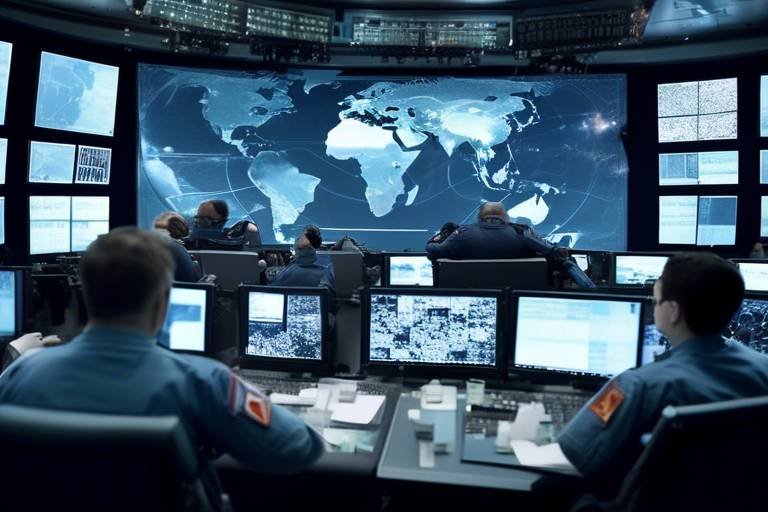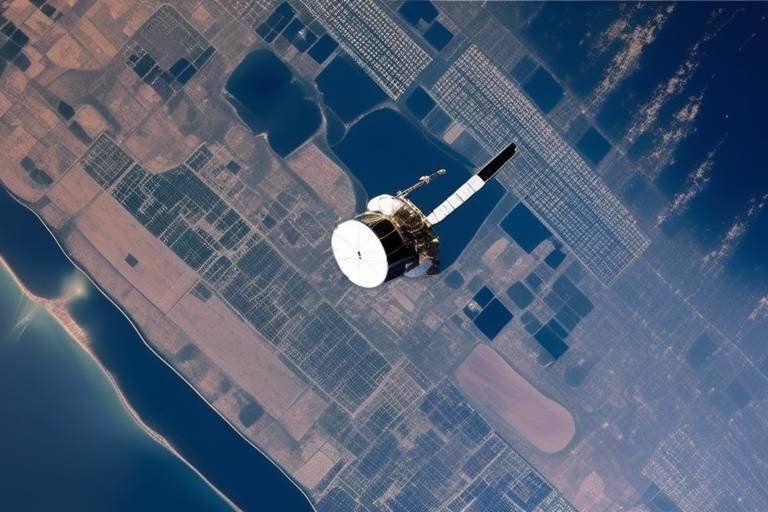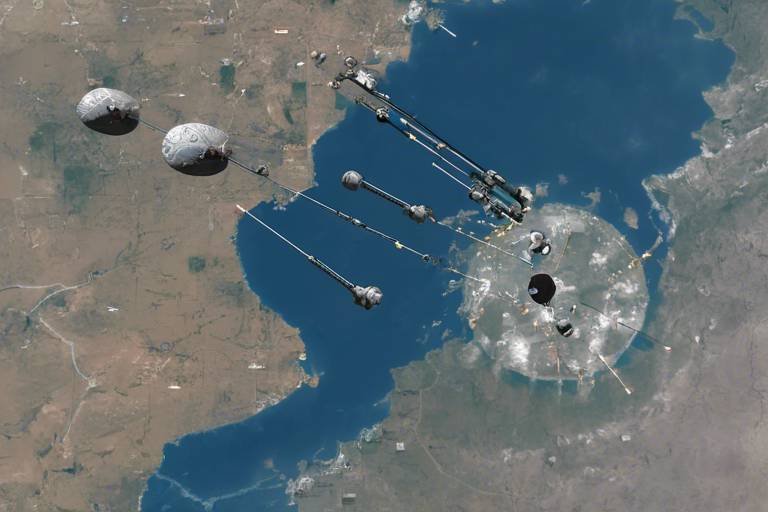Understanding the Importance of Space Policy for Defense
In today's rapidly evolving world, the significance of space policy in national defense cannot be overstated. As nations increasingly rely on space for communication, reconnaissance, and strategic operations, the formulation of effective space policies becomes a top priority. Imagine a chess game where every piece is not just on a board but also floating in the cosmos; each move can have profound implications not only on the game but on global stability. This article delves into the critical role space policy plays in shaping military strategies, enhancing security, and navigating the complex web of international relations.
Space is no longer the final frontier; it has transformed into a bustling arena of military operations. From satellite communications that keep troops connected to advanced reconnaissance systems that provide real-time intelligence, the importance of space in modern defense strategies is undeniable. The ability to monitor adversaries, coordinate operations, and respond swiftly to threats relies heavily on our capabilities in space. Therefore, understanding the nuances of space policy is essential for any nation looking to fortify its defense mechanisms.
Moreover, space policy is not just about military might; it encompasses a wide array of factors including international cooperation, technological advancements, and the ethical implications of space exploration. Countries must work together to establish regulations that govern the use of outer space, ensuring that it remains a domain for peaceful exploration rather than a battleground for conflict. The challenge lies in balancing national interests with global security, a task that requires robust dialogue and collaboration among nations.
In this context, the role of international treaties becomes crucial. Treaties such as the Outer Space Treaty set the groundwork for how countries can operate in space. They aim to prevent the militarization of space and promote the peaceful use of outer space. However, compliance with these treaties is often fraught with challenges. Different nations have varying priorities, and as more countries develop their space capabilities, the potential for conflict increases. This underscores the need for continuous dialogue and reassessment of existing agreements to adapt to the changing landscape.
As we explore the implications of space policy for national defense, it's essential to recognize that technological advancements are reshaping the battlefield. Innovations in satellite technology, missile defense systems, and cyber capabilities are not just enhancing military effectiveness; they are also introducing new vulnerabilities. Protecting these assets from cyber threats is a paramount concern, as a single breach could compromise national security. Thus, a comprehensive space policy must address not only the deployment of technology but also the safeguarding of these critical systems.
In conclusion, the intersection of space policy and national defense is a dynamic and complex field. As we continue to navigate this uncharted territory, the importance of developing effective and collaborative space policies cannot be overstated. Nations must work together to ensure that space remains a domain for peace and security, while also preparing for the challenges that lie ahead. The future of defense is not just on the ground or in the air; it's also in the stars.
- What is the main goal of space policy in defense?
Space policy aims to establish regulations and frameworks that govern military operations in outer space, ensuring security and promoting peaceful use. - How do international treaties influence space policy?
Treaties like the Outer Space Treaty provide guidelines for nations to follow, helping to prevent conflict and promote cooperation in space exploration. - What are the challenges in enforcing space treaties?
Challenges include differing national interests, lack of compliance, and the increasing militarization of space by emerging space powers. - Why is cybersecurity important in space defense?
As reliance on space assets grows, so does vulnerability to cyber threats. Protecting these assets is critical for maintaining national security. - How can nations collaborate on space defense?
International collaboration through joint initiatives and sharing of technology can enhance security and foster trust among nations.
The Role of Space in Modern Defense
When we think about defense in the modern world, it's easy to picture tanks rolling across the battlefield or fighter jets soaring through the sky. However, there's a whole other battlefield that often goes unnoticed—the vast expanse of outer space. In today's technologically advanced society, space has emerged as a crucial domain for military operations, influencing everything from strategy and communication to reconnaissance and intelligence gathering. Just imagine how different World War II would have been if countries had access to satellite imagery or GPS technology! Understanding the role of space in defense is not just important; it's absolutely essential for developing effective defense policies that can adapt to the challenges of our time.
The impact of space on military operations cannot be overstated. For instance, satellite systems play a pivotal role in global positioning, allowing for precise navigation and targeting. This technology has transformed how military forces plan and execute missions. Moreover, communication satellites ensure that troops remain connected, even in the most remote locations. It's like having a lifeline that keeps everyone coordinated, ensuring that strategies are executed flawlessly. Without these advancements, military operations would be significantly hampered, leading to inefficiencies and increased risks.
Additionally, reconnaissance satellites provide invaluable intelligence that can inform decision-making processes. They allow nations to monitor potential threats and gather information about enemy movements without the need for boots on the ground. This kind of surveillance is akin to having a bird’s-eye view of the battlefield, offering insights that can make or break military strategies. The ability to detect changes in enemy capabilities or intentions can give a nation the upper hand, allowing for preemptive actions that safeguard national interests.
Moreover, the importance of space extends beyond just military applications. It also encompasses international relations. Countries that invest in space capabilities often find themselves in a position of power, influencing global dynamics. This has led to a new kind of diplomacy, where nations engage in discussions about space cooperation, sharing technology, and even developing joint missions. However, this also raises questions about competition and conflict in space. With more nations entering the space race, the potential for misunderstandings and aggressive posturing increases. Therefore, understanding the nuances of space policy is vital for maintaining peace and security on a global scale.
In summary, the role of space in modern defense is multifaceted and critical. From enabling advanced military operations to shaping international relations, space is a domain that cannot be overlooked. As we continue to navigate the complexities of global security, it is essential to recognize the strategic importance of space and to develop policies that ensure its responsible use. After all, the future of defense may very well depend on our ability to harness the power of the stars.
- Why is space important for national defense? Space provides crucial capabilities for communication, navigation, and surveillance, which are essential for modern military operations.
- How do satellites enhance military strategy? Satellites offer real-time data and intelligence, allowing for informed decision-making and precise execution of military plans.
- What are the risks associated with space militarization? Increasing militarization can lead to conflicts in space, raising concerns about global security and the potential for space debris.
- How do international treaties affect space policy? Treaties like the Outer Space Treaty aim to promote peaceful exploration and prevent conflict, but compliance can be challenging.
Key Components of Space Policy
When we talk about space policy, we're diving into a complex web of regulations, agreements, and technological advancements that shape how nations interact with the final frontier. It's not just about sending rockets into orbit; it's about creating a framework that ensures the secure and responsible use of outer space, especially when it comes to defense. You might wonder, what exactly are the key components that make up this intricate policy landscape? Let's break it down.
First off, we have regulations. These are the rules that govern how countries can utilize space. Think of them as the traffic laws of the cosmos. Just like how we need traffic lights to prevent chaos on the roads, we need regulations to ensure that satellites don't collide and that military operations in space are conducted responsibly. These regulations can vary significantly from one nation to another, leading to a patchwork of rules that can complicate international cooperation.
Next, we have international agreements. These treaties, such as the Outer Space Treaty of 1967, aim to promote peaceful exploration and prevent conflict in outer space. They establish guidelines on the use of celestial bodies and the responsibilities of nations in space activities. However, the challenge lies in getting all countries to adhere to these agreements. With emerging space powers entering the arena, the dynamics of these agreements are constantly evolving.
Technological advancements are another critical component of space policy. As technology evolves, so too do the capabilities of nations to operate in space. From sophisticated satellite systems that provide real-time data to missile defense technologies designed to protect against threats, these innovations play a vital role in shaping defense strategies. Staying ahead in technology is not just a matter of national pride; it’s a matter of national security.
Moreover, we cannot overlook the importance of collaboration. International partnerships are increasingly vital in developing effective space policies. Countries can pool resources, share intelligence, and work together on joint initiatives that enhance security. For instance, collaborative defense initiatives can lead to more resilient strategies that address common threats in space. This cooperation can take various forms, from joint missions to shared research and development.
To summarize, the key components of space policy encompass:
- Regulations that govern space activities.
- International agreements that promote peaceful use of space.
- Technological advancements that enhance defense capabilities.
- Collaboration among nations to strengthen security.
In conclusion, understanding these components is essential for anyone interested in the future of national defense in an increasingly space-oriented world. The interplay of regulations, agreements, technology, and collaboration defines how we navigate the challenges and opportunities that space presents. As we look to the stars, it’s clear that a robust and adaptable space policy is more critical than ever.
- What is space policy? Space policy refers to the guidelines and regulations that govern how nations utilize outer space for various purposes, including defense.
- Why are international agreements important? These agreements help promote peaceful exploration and prevent conflicts in space, ensuring that all nations adhere to a common set of rules.
- How do technological advancements affect space policy? As technology evolves, it changes the capabilities of nations in space, necessitating updates and adaptations in space policy to address new challenges.
- What role does collaboration play in space defense? Collaboration among nations enhances security, fosters trust, and leads to more effective defense strategies in the space domain.
International Treaties and Agreements
International treaties and agreements serve as the backbone of space governance, shaping how nations interact in the vast expanse beyond our atmosphere. The most notable of these is the Outer Space Treaty, established in 1967, which lays down fundamental principles for the peaceful use of outer space. This treaty asserts that space shall be free for exploration and use by all countries, emphasizing that celestial bodies are not subject to national appropriation by any means. In essence, it promotes a cooperative approach to space exploration, urging nations to work together rather than compete aggressively.
However, the effectiveness of these treaties is often challenged by the increasing militarization of space. As countries develop advanced technologies for defense purposes, the original spirit of these agreements can become strained. For instance, while the Outer Space Treaty promotes peaceful exploration, the emergence of anti-satellite weapons and the deployment of military satellites raise questions about compliance and interpretation. This evolving landscape necessitates a reevaluation of existing treaties and the creation of new agreements to address contemporary challenges.
Moreover, international cooperation in space is not limited to the Outer Space Treaty. Numerous agreements and frameworks exist to facilitate collaboration among nations. For example, the Registration Convention requires countries to register space objects with the United Nations, promoting transparency in space activities. Additionally, the Liability Convention establishes liability for damage caused by space objects, ensuring accountability among nations. Such agreements are crucial in fostering trust and reducing the risk of conflicts in space.
As we move forward, the importance of these treaties cannot be overstated. They provide a legal framework that governs the actions of nations in space and help mitigate the risks associated with space activities. However, compliance remains a significant challenge. Many countries have different interpretations of treaty obligations and may prioritize national interests over international cooperation. This divergence can lead to tensions and misunderstandings, highlighting the need for ongoing dialogue and negotiation among nations.
To illustrate the significance of these treaties, let's take a look at some key agreements and their implications:
| Treaty/Agreement | Year Established | Main Purpose |
|---|---|---|
| Outer Space Treaty | 1967 | Promotes peaceful exploration and prohibits national appropriation of outer space. |
| Registration Convention | 1976 | Requires states to register space objects with the UN. |
| Liability Convention | 1972 | Establishes liability for damages caused by space objects. |
In conclusion, while international treaties and agreements are vital for maintaining order and peace in space, their effectiveness is continually tested by the complexities of modern geopolitics. As nations pursue their interests in this new frontier, the challenge lies in balancing national security with the collective responsibility of ensuring that space remains a domain for peaceful exploration. Addressing compliance issues and fostering international cooperation will be essential to uphold the integrity of these agreements and to navigate the future of space policy effectively.
- What is the Outer Space Treaty?
The Outer Space Treaty is an international agreement that establishes the principles for the peaceful use of outer space, prohibiting the appropriation of celestial bodies by any nation. - Why are international treaties important for space governance?
These treaties provide a legal framework that governs the actions of nations in space, promoting cooperation and reducing the risk of conflict. - What challenges do these treaties face?
Challenges include varying interpretations of treaty obligations, national interests that may conflict with international cooperation, and the increasing militarization of space.
Challenges in Compliance
When it comes to space policy, the concept of compliance is a slippery slope. Despite the existence of established international treaties, such as the Outer Space Treaty, nations often find themselves at a crossroads between adhering to these agreements and pursuing their own national interests. This creates a complex environment where the **balance of power** and **strategic autonomy** often take precedence over global cooperation. The challenges in compliance can be attributed to several factors:
- Diverse National Interests: Each country has its own set of priorities and security concerns, which can lead to conflicting interpretations of what constitutes compliance. For instance, a nation might prioritize its defense capabilities in space, viewing it as a necessity, while another may see it as a potential threat.
- Technological Advancements: The rapid pace of technological innovation complicates compliance efforts. New technologies can outpace existing treaties, leaving gaps that nations can exploit. For example, advancements in satellite technology have made it easier for countries to gather intelligence, but they also raise concerns about surveillance and privacy.
- Militarization of Space: The increasing militarization of space presents a significant challenge to compliance. As more nations develop military capabilities in space, the potential for conflict rises, leading to a more aggressive stance on defense policies. This arms race mentality can undermine the very essence of international agreements aimed at promoting peace.
Moreover, the lack of a robust enforcement mechanism for these treaties means that violations often go unpunished. This creates a sense of **impunity**, where nations feel they can act without repercussions. For example, if a country conducts anti-satellite tests, it may not face any significant consequences, thus encouraging further violations. The **trust deficit** among nations exacerbates this situation, as countries may question each other's intentions and capabilities.
In the face of these challenges, it’s crucial for nations to engage in dialogue and foster **collaboration**. This could involve revisiting existing treaties to address contemporary issues or creating new frameworks that account for the evolving landscape of space activities. Only through **open communication** and a commitment to mutual understanding can the international community hope to navigate the complexities of compliance in space policy.
Ultimately, the challenges in compliance are not just about legal obligations; they reflect broader issues of **international relations** and **security**. As we move further into the era of space exploration and utilization, addressing these challenges will be essential for ensuring a peaceful and secure outer space environment.
- What is the Outer Space Treaty? The Outer Space Treaty is a key international agreement that establishes the framework for the governance of space activities, promoting peaceful exploration and preventing the militarization of outer space.
- Why is compliance with space treaties challenging? Compliance is challenging due to diverse national interests, rapid technological advancements, and the increasing militarization of space which can create conflicting priorities among nations.
- How can nations improve compliance with space policies? Nations can improve compliance by engaging in open dialogue, revising existing treaties, and fostering international collaboration to address contemporary issues in space governance.
Emerging Space Powers
In recent years, the landscape of space exploration and defense has dramatically shifted with the emergence of new space-faring nations. Countries like India, China, and Israel have made significant strides in their space capabilities, challenging the traditional dominance of established powers such as the United States and Russia. This rise of emerging space powers is not just a matter of technological advancement; it's a complex interplay of national interests, economic ambitions, and geopolitical strategies.
These nations are not merely spectators in the cosmic arena; they are actively shaping its future. For instance, India's successful Mars Orbiter Mission showcased its growing capabilities and ambitions, demonstrating that it can compete on a global scale. Similarly, China's aggressive investments in space technology, including its plans for a lunar base and Mars exploration, highlight its intent to establish itself as a major player in the space domain.
But why should we care about these emerging space powers? Well, their motivations and actions can have profound implications for global security and international relations. As these nations develop their space capabilities, they also expand their military reach, which can lead to increased tensions and competition. For example, China's advancements in anti-satellite weapons raise concerns about the potential for conflict in space, which could have dire consequences for all nations that rely on satellite technology for communication, navigation, and surveillance.
Moreover, the rise of these new players complicates the existing framework of international treaties and agreements. With varying national interests and priorities, achieving consensus on space governance becomes increasingly challenging. It’s crucial to understand that the motivations of these emerging powers often differ significantly from those of established nations. While some may pursue peaceful exploration, others may have more aggressive military objectives. This divergence can lead to a fragmented approach to space policy, making it difficult to address pressing issues such as space debris, resource allocation, and conflict prevention.
To navigate this complex landscape, it is vital for established powers to engage in diplomatic dialogues with emerging space nations. Collaborative efforts can foster mutual understanding and trust, paving the way for cooperative frameworks that benefit all parties involved. As we look to the future, the question remains: how can we ensure that the rise of emerging space powers contributes to a more secure and peaceful space environment?
In conclusion, the emergence of new space powers is not just a trend; it represents a fundamental shift in the dynamics of global space policy. By recognizing their motivations and capabilities, we can work towards a more comprehensive and inclusive approach to space governance that addresses the challenges and opportunities of the 21st century.
- What are emerging space powers? Emerging space powers are nations that have recently developed significant capabilities in space exploration and defense, such as India, China, and Israel.
- Why is the rise of these powers important? Their rise impacts global security, international relations, and the existing frameworks of space governance, potentially leading to increased competition and conflicts.
- How can established powers engage with emerging space nations? Through diplomatic dialogues and collaborative initiatives, established powers can foster understanding and cooperation in space governance.
Technological Advancements in Space Defense
The landscape of space defense is rapidly evolving, driven by technological advancements that are reshaping how nations approach security in the cosmos. From sophisticated satellite systems to cutting-edge missile defense technologies, these innovations are not just enhancing military capabilities but are also redefining the very concept of national security. Imagine space as a vast chessboard, where every move can have far-reaching consequences; the introduction of new technologies adds layers of complexity to this strategic game.
One of the most significant developments in this arena is the deployment of advanced satellite systems. These satellites provide critical capabilities such as real-time reconnaissance, communication, and navigation. For instance, the use of low Earth orbit (LEO) satellites has revolutionized surveillance, offering unprecedented resolution and coverage. Countries like the United States and China have been investing heavily in these technologies, creating constellations of satellites that can monitor activities on Earth and in space with remarkable precision. The implications of this are profound, as nations can now gather intelligence more effectively than ever before, ensuring they stay one step ahead of potential threats.
Moreover, the emergence of missile defense systems has changed the dynamics of deterrence. These systems are designed to intercept and destroy incoming threats, such as ballistic missiles, before they can reach their targets. Technologies like ground-based midcourse defense (GMD) and Aegis Ballistic Missile Defense are at the forefront of this shift. They represent a significant leap in how nations can protect their territories from aerial attacks, thus enhancing their overall security posture. The effectiveness of these systems, however, depends on continuous advancements in tracking and interception technologies, which are constantly being refined to address evolving threats.
As we delve deeper into the technological advancements, we cannot overlook the role of artificial intelligence (AI) and machine learning in space defense. These technologies are being integrated into various systems to enhance decision-making processes and improve threat detection. AI can analyze vast amounts of data from satellite feeds, identifying patterns and potential threats much faster than human operators could. This capability is crucial in today’s fast-paced environment, where seconds can make the difference between thwarting an attack or facing catastrophic consequences.
However, with these advancements comes a host of challenges and vulnerabilities. As nations become more reliant on space technologies, they also increase their exposure to cyber threats. Protecting space assets from potential cyberattacks is now a top priority. Cybersecurity measures must evolve in tandem with technological advancements to safeguard sensitive information and ensure the integrity of defense systems. This creates a complex web of responsibilities for defense agencies worldwide, as they must not only innovate but also fortify their existing frameworks against emerging threats.
In conclusion, the realm of space defense is at a pivotal point, where technological advancements are both a boon and a challenge. Nations must navigate this delicate balance, leveraging innovations to enhance their security while simultaneously addressing the vulnerabilities that come with increased reliance on technology. As we look to the future, the ongoing evolution of space defense will undoubtedly play a crucial role in shaping international relations and global security dynamics.
- What are the main technological advancements in space defense?
Key advancements include advanced satellite systems, missile defense technologies, and the integration of artificial intelligence for threat detection.
- How do satellite systems enhance national security?
They provide real-time reconnaissance, communication, and navigation capabilities, allowing for effective monitoring and intelligence gathering.
- What role does AI play in space defense?
AI enhances decision-making processes and improves threat detection by analyzing large datasets quickly and accurately.
- What are the cybersecurity challenges in space defense?
As reliance on space technologies increases, so does vulnerability to cyber threats, necessitating robust cybersecurity measures to protect sensitive information.
The Impact of Space Policy on National Security
Space policy is not just a set of guidelines; it is a significant framework that shapes the very fabric of national security. In today's world, where threats can emerge from unexpected places, the importance of a robust space policy cannot be overstated. Imagine space as the new frontier, much like the oceans were centuries ago. Just as nations sought to control sea routes for trade and military advantage, now they are vying for dominance in the vastness of space. This competition has profound implications for national security.
One of the most striking impacts of space policy on national security is how it influences military capabilities. With the increasing reliance on satellite systems for communication, navigation, and reconnaissance, the effectiveness of military operations is heavily dependent on these space assets. For instance, consider the role of GPS satellites; without them, modern military operations would face severe challenges in coordination and precision. A comprehensive space policy ensures that these assets are protected and that there are protocols in place to respond to potential threats, including those posed by adversaries who may seek to disrupt or destroy these vital systems.
Furthermore, the evolution of space policy directly correlates with the formation of strategic partnerships. Countries are recognizing that they cannot navigate the complexities of space alone. Collaborative defense initiatives, such as joint satellite programs and shared intelligence operations, are becoming increasingly common. These partnerships not only enhance security but also foster trust among nations. For example, the collaboration between NATO countries in space surveillance showcases how collective efforts can lead to a more resilient defense posture against emerging threats.
However, the landscape is not without its challenges. As space becomes more congested and contested, the potential for conflict increases. The rise of cyber threats targeting space assets adds another layer of complexity. Cybersecurity measures must be integrated into space policy to safeguard these critical systems. This means that national security is not just about physical deterrents; it also involves protecting the digital infrastructure that supports space operations. A robust space policy must therefore include comprehensive cybersecurity strategies to mitigate risks.
In summary, the impact of space policy on national security is multifaceted and dynamic. It shapes military capabilities, fosters international collaboration, and addresses emerging threats. As we look to the future, it is crucial for nations to prioritize the development of effective space policies that not only protect their interests but also contribute to global stability. The stakes are high, and the time to act is now.
- What is the significance of space policy in national defense?
Space policy is crucial as it governs the use of space for military operations, ensuring that nations can effectively protect their interests and respond to threats. - How does space policy influence military capabilities?
Space policy impacts military capabilities by ensuring the protection and operational readiness of satellite systems, which are essential for communication, navigation, and reconnaissance. - What role do international collaborations play in space defense?
International collaborations enhance security by pooling resources and intelligence, leading to more effective defense strategies against common threats. - Why is cybersecurity important in space policy?
As reliance on space assets grows, so does vulnerability to cyber threats. Effective cybersecurity measures are necessary to protect these critical systems from potential attacks.
Cybersecurity and Space Assets
The reliance on space assets for national defense has skyrocketed in recent years, making the need for robust cybersecurity measures more critical than ever. Imagine a world where satellites, which provide essential data for military operations, are compromised by cyberattacks. The implications could be catastrophic, affecting everything from communication systems to navigation capabilities. As we continue to integrate advanced technologies into our defense strategies, the vulnerabilities associated with these systems become increasingly apparent.
Space assets, including satellites and ground control systems, are often interconnected, creating a web of dependencies that hackers can exploit. Cybersecurity in this context is not just about protecting data; it’s about safeguarding the very backbone of national security. For instance, a successful cyber intrusion could lead to the manipulation of satellite data, resulting in incorrect intelligence that could mislead military operations. The stakes are incredibly high, and the consequences of inaction could be dire.
Additionally, as countries invest heavily in their space capabilities, the competition to develop cutting-edge technologies intensifies. This race not only includes advancements in satellite systems but also in cyber defense mechanisms. Governments must prioritize the development of comprehensive cybersecurity frameworks that address both current and emerging threats. This requires collaboration between military and civilian sectors, fostering an environment where expertise can be shared and innovations can flourish.
To highlight the importance of cybersecurity in protecting space assets, let's consider some of the key vulnerabilities:
- Data Interception: Hackers can intercept communications between satellites and ground stations, leading to unauthorized access to sensitive information.
- Signal Jamming: Disrupting signals can render satellite systems ineffective, impacting military operations.
- Software Exploits: Flaws in satellite software can be exploited to gain control over these systems.
The growing complexity of space operations also necessitates international collaboration. Countries must work together to establish common cybersecurity standards and protocols that govern the use of space assets. This cooperation is essential not only for enhancing security but also for building trust among nations. By sharing intelligence and resources, countries can create a more resilient defense posture against cyber threats.
In conclusion, as we navigate the evolving landscape of space defense, the importance of cybersecurity cannot be overstated. Protecting our space assets is not merely a technical challenge; it’s a fundamental component of national security strategy. Without a strong cybersecurity framework in place, we risk exposing our most critical defense capabilities to adversaries. The future of space defense hinges on our ability to secure these assets, ensuring that they remain a reliable component of our national defense infrastructure.
- What are space assets? Space assets refer to satellites, spacecraft, and ground control systems used for various purposes, including military operations, communication, and reconnaissance.
- Why is cybersecurity important for space assets? Cybersecurity is crucial for protecting space assets from cyber threats that can compromise data integrity, disrupt operations, and impact national security.
- How can countries collaborate on space cybersecurity? Countries can collaborate by establishing common cybersecurity standards, sharing intelligence, and developing joint defense initiatives to protect space assets.
Collaborative Defense Initiatives
In today's interconnected world, the notion of has taken center stage in the realm of space policy. As nations recognize that threats in space are not confined by borders, they are increasingly seeking to forge partnerships that transcend traditional rivalries. This shift is not merely a trend; it is a necessity for ensuring global security in an era where the stakes are higher than ever.
One of the most significant aspects of these initiatives is the sharing of intelligence and technology. Countries are pooling their resources to develop advanced satellite systems, missile defense technologies, and communication networks that are resilient against potential threats. For instance, the collaboration between the United States and its NATO allies has led to the establishment of joint space operations centers, enhancing situational awareness and response capabilities across the board. This level of cooperation allows for a more comprehensive approach to space defense, ensuring that all participating nations are on the same page when it comes to identifying and mitigating risks.
Moreover, collaborative defense initiatives foster trust among nations. By working together on joint missions and sharing best practices, countries can build stronger relationships that extend beyond mere military cooperation. This trust is vital, especially when considering the potential for misunderstandings or miscalculations in the high-stakes environment of space. When countries engage in regular dialogues and collaborative exercises, they create a foundation of mutual respect and understanding that can help avert conflicts.
However, it is essential to acknowledge the challenges that come with these initiatives. Differences in national interests, varying levels of technological advancement, and the potential for competition can complicate collaboration. To address these issues, nations must prioritize open communication and establish clear frameworks for cooperation. This can include formal agreements that outline the responsibilities and expectations of each party, as well as mechanisms for conflict resolution should disagreements arise.
In summary, the landscape of space defense is evolving, and collaborative defense initiatives are at the forefront of this transformation. By embracing partnerships, nations can enhance their capabilities, foster trust, and create a more secure environment for all. As we look to the future, the importance of these initiatives cannot be overstated; they are not just beneficial—they are essential for navigating the complexities of modern defense in the vast expanse of space.
- What are collaborative defense initiatives?
Collaborative defense initiatives refer to partnerships between nations aimed at enhancing security and defense capabilities in space through shared resources, technology, and intelligence. - Why are these initiatives important?
They are crucial for addressing shared threats, fostering trust among nations, and ensuring a coordinated response to potential space-related challenges. - What challenges do these initiatives face?
Challenges include differing national interests, levels of technological advancement, and potential competition among nations, which can complicate collaboration.
Frequently Asked Questions
- What is the significance of space policy in national defense?
Space policy is crucial for national defense because it shapes the strategies and capabilities that nations use to protect their interests. As military operations increasingly rely on space for communication, reconnaissance, and navigation, having a robust space policy ensures that these operations are secure and effective.
- How do international treaties impact space policy?
International treaties, such as the Outer Space Treaty, establish guidelines for the peaceful use of outer space and help prevent conflicts. These agreements are essential as they promote cooperation among nations and set the legal framework for space activities, ensuring that countries adhere to shared norms and standards.
- What challenges exist in complying with space treaties?
Compliance with space treaties is challenging due to differing national interests and the growing militarization of space. Countries may prioritize their security needs over treaty obligations, leading to conflicts and potential escalations in tensions. Addressing these issues is vital for maintaining global security.
- Why are emerging space powers important to consider?
The rise of new space-faring nations adds complexity to international relations. Understanding their motivations, capabilities, and intentions is essential for crafting comprehensive space policies that account for a wider range of interests and potential conflicts.
- What role do technological advancements play in space defense?
Technological innovations, such as advanced satellite systems and missile defense technologies, are reshaping space defense strategies. Staying ahead of these advancements is crucial for maintaining a competitive edge and ensuring national security against evolving threats.
- How does space policy influence national security?
Space policy directly influences national security by determining the capabilities available to military forces and shaping strategic partnerships. A well-defined policy framework is essential for addressing emerging threats and ensuring that nations can respond effectively to challenges in the space domain.
- What are the cybersecurity risks associated with space assets?
As nations become more reliant on space assets, they also become more vulnerable to cyber threats. Protecting these assets through robust cybersecurity measures is critical for safeguarding national defense and ensuring that military operations can continue without disruption.
- Why is international collaboration important in space defense?
International collaboration enhances security by fostering trust among nations and allowing for shared resources and knowledge. Joint defense initiatives can lead to more resilient strategies, making it easier for countries to respond collectively to threats in the space domain.


